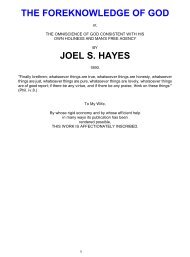Are Men Born Sinners? - Library of Theology
Are Men Born Sinners? - Library of Theology
Are Men Born Sinners? - Library of Theology
You also want an ePaper? Increase the reach of your titles
YUMPU automatically turns print PDFs into web optimized ePapers that Google loves.
Regeneration, according to this school, is a change in the constitutional nature <strong>of</strong> man. It<br />
is a change wrought by the power <strong>of</strong> the Holy Spirit, in which the sinner is wholly<br />
passive, and in which new and holy susceptibilities, dispositions, tastes, and appetites are<br />
implanted or created in the soul.<br />
The problem with this is that no such physical or passive regeneration is taught in the<br />
Bible. The Bible teaches that the work which the Holy Spirit does in the sinner is moral<br />
rather than physical. It is a work <strong>of</strong> moral suasion, <strong>of</strong> divine teaching and illumination, <strong>of</strong><br />
convicting and reproving <strong>of</strong> sin. John 6:44-45, John 16:8, James 1:18, John 15:3, I Peter<br />
1:22-23. The Bible teaches that the sinner cannot be passive in regeneration, but he must<br />
respond to the voice <strong>of</strong> God. He must repent and make to himself "a new heart and a new<br />
spirit." Ez. 18:30-32.<br />
The Bible teaches that regeneration is the work <strong>of</strong> both God and man: (1) The work <strong>of</strong><br />
God: Titus 3:5, James 1:18, I John 3:9, John 3:5, John 6:44-45; (2) The work <strong>of</strong> the<br />
sinner himself: Ez. 18:31, I Peter 1:22, James 4:7-8, Acts 3:19, James 1:21, Jer. 4:14; (3)<br />
The work <strong>of</strong> men who preach the Word <strong>of</strong> God: I Cor. 4:15, Fil. 1:10, James 5:19-20,<br />
Prov. 11:30, Dan. 12:3, Mark 1:17, I Cor. 9:22; and (4) The work <strong>of</strong> the Word <strong>of</strong> God: I<br />
Cor. 4:15, James 1:18, James 1:21, I Peter 1:23.<br />
There is no passive physical change in the sinner when he becomes a saint. The Bible<br />
teaches that regeneration is an active, cooperative, moral change, and not a passive<br />
physical change.<br />
f. The doctrine <strong>of</strong> a natural inability to repent.<br />
If man's very nature is sinful, then it is a natural impossibility for him to repent. This fact<br />
has led naturally and necessarily to the doctrine that God first changes the sinner's nature<br />
in regeneration (passive regeneration), and then the sinner repents. According to this<br />
school <strong>of</strong> thought, repentance and conversion both follow regeneration because the sinner<br />
cannot obey God's command to repent and be converted until after he has been<br />
regenerated.<br />
g. The doctrines <strong>of</strong> arbitrary election and reprobation, absolute and unconditional<br />
predestination, irresistible grace, and a necessitated will.<br />
All <strong>of</strong> the above doctrines follow logically from a belief in constitutional sinfulness.<br />
Augustine, the father <strong>of</strong> the doctrine <strong>of</strong> original sin, taught that salvation depends on<br />
God's inscrutable election and predestination, independent <strong>of</strong> any human agency. He<br />
taught that man is born with a corrupt and depraved nature, that he is not free (except to<br />
do evil), that he has a necessitated will, that God's love is infused, and that man is by<br />
nature absolutely unable to love God, or do anything good. These teachings <strong>of</strong> Augustine<br />
engendered fatalism and despair in the hearts <strong>of</strong> some in the Catholic Church:






